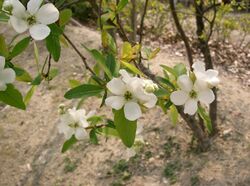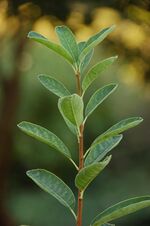Biology:Exochorda racemosa
| Exochorda racemosa | |
|---|---|

| |
| Flowers of E. racemosa in Japan . | |
| Scientific classification | |
| Kingdom: | Plantae |
| Clade: | Tracheophytes |
| Clade: | Angiosperms |
| Clade: | Eudicots |
| Clade: | Rosids |
| Order: | Rosales |
| Family: | Rosaceae |
| Genus: | Exochorda |
| Species: | E. racemosa
|
| Binomial name | |
| Exochorda racemosa (Lindl.) Rehder
| |
| Synonyms[1] [2] | |
| |
Exochorda racemosa, the pearlbush or common pearlbush, is a species of plant in the family Rosaceae. This species is mostly found in China and Japan .[3]
Taxonomy and etymology
Exochorda racemosa was first described by John Lindley. It is placed in the genus Exochorda and family Rosaceae, the rose family.[4] The plant gets its common name, "common pearlbush", from its pearl-looking flowers.[5]
Description
A loose, irregular or vase-shaped and upright shrub, this species is deciduous. It has oblong leaves, about 4–6 cm (1.6–2.4 in) long and 1–2 cm (0.39–0.79 in) wide, that are rounded and toothed at the margin on the top. The flowers are white, and flower in late April to early May.[6] The flowers have round petals, 12-25 stamens, borne in racemes in groups of about six or ten. Their diameter is 4 cm (1.6 in). Flowers give way to brown, dehiscent seed capsules.[2]
Subspecies
- Exochorda racemosa subsp. serratifolia (S.Moore) F.Y.Gao & Maesen – Korean pearl bush[7]
References
- ↑ {{citation | mode = cs1 | title = Exochorda racemosa | work = Germplasm Resources Information Network (GRIN) | url = | publisher = [[Organization:Agricultural Research ServAgricultural Research Service (ARS), United States Department of Agriculture (USDA) | access-date = 14 January 2018 }}
- ↑ 2.0 2.1 "Exochorda racemosa (Common Pearlbush, Pearlbush) | North Carolina Extension Gardener Plant Toolbox". https://plants.ces.ncsu.edu/plants/exochorda-racemosa/.
- ↑ Ran Levy-Yamamori, Gerard Taaffe (2004). Garden plants of Japan. USA: Timber Press. p. 109. ISBN 0-88192-650-7.
- ↑ William C. Welch; Greg Grant; Cynthia W. Mueller; Jason Powell (7 April 2011). Heirloom gardening in the South : yesterday's plants for today's gardens (1st ed.). Texas A&M University Press. ISBN 978-1-60344-213-8.
- ↑ Dirr, Michael (1997) (PDF). Dirr's Hardy trees and shrubs: an illustrated encyclopedia. USA: Timber Press. p. 154. ISBN 0-88192-404-0. https://books.google.com/books?id=CmKi3t5qZe4C&q=Exochorda+racemosa&pg=PA154. "The expanding buds appear as small pearls - hence, the common name."
- ↑ Kling, Gary J.. "Exochorda racemosa Common pearlbush". University of Illinois. Woody Plants. http://woodyplants.nres.uiuc.edu/plant/exora.
- ↑ English Names for Korean Native Plants. Pocheon: Korea National Arboretum. 2015. pp. 467. ISBN 978-89-97450-98-5. http://www.forest.go.kr/kna/special/download/English_Names_for_Korean_Native_Plants.pdf. Retrieved 24 December 2016.
Wikidata ☰ Q5420521 entry
 |


